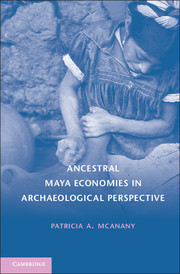Book contents
- Frontmatter
- Dedication
- Contents
- List of Figures
- Preface and Acknowledgments
- 1 The Materiality of Practice in Ancestral Maya Economies
- 2 Situating Maya Societies in Space and Time
- 3 Feeding a Hungry Landscape
- 4 Gendered Labor and Socially Constructed Space
- 5 Ritual Works: Monumental Architecture and Generative Schemes of Power
- 6 Naturalized Authority of the Royal Court
- 7 Social Identity and the Daily Practice of Artisan Production
- 8 Places, Practices, and People of Commerce
- 9 Flowery Speech of Maya Tributary Arrangements
- 10 Skeining the Threads
- References Cited
- Index
6 - Naturalized Authority of the Royal Court
Published online by Cambridge University Press: 05 December 2014
- Frontmatter
- Dedication
- Contents
- List of Figures
- Preface and Acknowledgments
- 1 The Materiality of Practice in Ancestral Maya Economies
- 2 Situating Maya Societies in Space and Time
- 3 Feeding a Hungry Landscape
- 4 Gendered Labor and Socially Constructed Space
- 5 Ritual Works: Monumental Architecture and Generative Schemes of Power
- 6 Naturalized Authority of the Royal Court
- 7 Social Identity and the Daily Practice of Artisan Production
- 8 Places, Practices, and People of Commerce
- 9 Flowery Speech of Maya Tributary Arrangements
- 10 Skeining the Threads
- References Cited
- Index
Summary
So it was when the first people emerged. Jaguars accompanied some of them; coyotes accompanied some; weasels accompanied others. But those whom the jaguars accompany, these are the richest. Those whom the coyote accompany, these are not so rich. Those whom the weasel accompanies, these people are poorer. Those whom the fox accompany, these are the poorest, just as poor as those of the weasel. … Those human counterparts of both the fox and the weasel, they do not live very long. … Our Father long ago gave us dreams about our animal-soul companions. That is why it remains the same even today, that not all of us have jaguars as animal souls.
Gossen 1993:428–429This “true, ancient narrative” spoken by Méndez Tzotzek to anthropologist Gary Gossen in 1969 provides a matter-of-fact statement of the profound cosmological underpinnings of inequality in twentieth-century Maya society, complete with differential life-span expectations. To most Westerners who embrace the ethos, if not the reality, of equality, such a matter-of-fact statement that explains hierarchy as the result of a natural cause (i.e., animal soul companion) seems very foreign. Yet, the most powerful and enduring forces of hierarchizing are those that naturalize difference so that it is beyond dispute and something to be tacitly accepted. Such hierarchization has been described by Touraine (1977:461) as a type of historical action by which a cultural model is transformed into a principle of social order.
- Type
- Chapter
- Information
- Ancestral Maya Economies in Archaeological Perspective , pp. 158 - 198Publisher: Cambridge University PressPrint publication year: 2010

